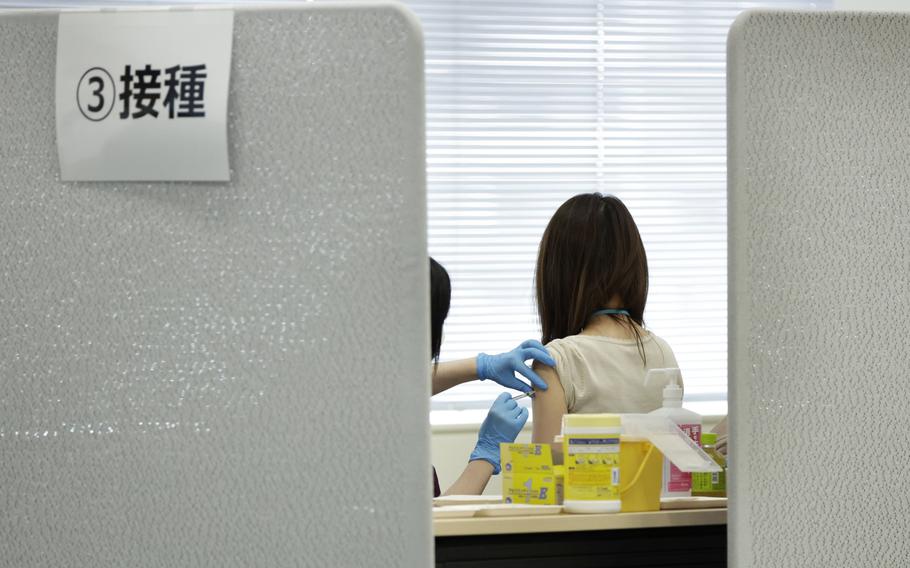
A Suntory Holdings employee receives a dose of the Moderna COVID-19 vaccine at the company's office in Tokyo , on June 21, 2021. (Kiyoshi Ota/Bloomberg)
Some Japanese municipalities have stopped taking vaccination reservations due to short supplies from the central government, possibly slowing inoculations nationwide just weeks before Tokyo hosts the Olympics.
Osaka City — part of Japan’s second largest metropolitan area — will suspend reservations for first-time vaccinations on July 12 because of a lack of clarity on supply from the government, Mayor Ichiro Matsui said Friday in Tokyo after meeting Prime Minister Yoshihide Suga. The city of Chiba, just east of Tokyo, said it would suspend new appointments starting Friday, while a handful of other areas have stopped taking new reservations or pushed back plans to open access to people below the age of 65, according to Jiji Press.
Japan’s vaccination drive has picked up speed after getting off to a slow start but will be nowhere reaching the bulk of the population before the country hosts the Olympics. Any slowdown in vaccinations puts pressure on Suga’s government as it tries hold the global sports spectacle during a pandemic and tamp down on a worrying spike in infections in Tokyo ahead of the July 23 opening ceremony.
“It is the issue of maldistribution rather than a shortage,” said Kenji Shibuya, a former World Health Organization adviser now in charge of overseeing vaccinations in Soma, Fukushima in northern Japan. Shibuya said the city has secured enough doses for its population of around 34,000 and plans on finishing inoculations in mid-July.
When asked about the situation in Osaka, Katsunobu Kato, the government’s top spokesman, told reporters Friday they were continuing with plans to provide advance information on vaccine distribution plans as quickly as possible.
In recent days, Suga and other top officials have reminded the public that holding the Olympics without spectators remains an option.
Japan is mainly using imported Pfizer Inc. and BioNTech SE vaccines and inoculations are mostly carried out by local governments. Municipalities design inoculation plans for residents, and put in requests with the central government for the expected amount of vaccine. The central government, which holds the supply, then distributes the doses.
The country has administered more than a million daily shots for several days in June but only about 12% of Japan’s population is fully vaccinated — the lowest among its Group of Seven peers, which have full-vaccination rates of between 31% to 50% of the population.
Japan is racing to fully vaccinate around 36 million of its residents over the age of 65 before the end of July. The Olympics have fueled worries of potential virus spread due to more people moving around domestically to watch the games, and tens of thousands of participants coming in from overseas.
Health Minister Norihisa Tamura said in late June it was possible some municipalities were stockpiling vaccines, adding more careful calculations of requested vaccine doses were needed for more efficient distribution, according to the Nikkei newspaper.
The National Governors’ Association said in a statement June 19 the supply of Pfizer shots to local governments would greatly decrease in July and called for the central government to give more concrete information on deliveries to municipalities so the vaccination program can continue smoothly.